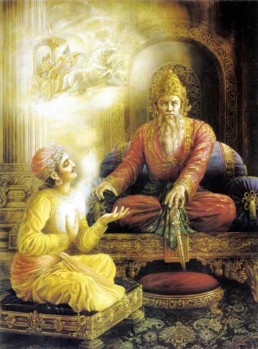Thus shown by Shri Krishna, Arjuna recognised in his enemy lines all his kith and kin, near and dear family members, brothers and cousins, teachers and grandsires, and almost all his acquaintances and friends. He recognized such intimate relations not only in the enemy lines, but even in his own army. This sight, perhaps, brought to his mind, for the first time, the full realisation of the tragedies of a fratricidal war. As a warrior and a man of action, he did not, perhaps till then, fully realize the extent of sacrifice that society would be called upon to make in order that his ambition might be fulfilled and Duryodhana’s cruelties avenged.
Whatever might have been the cause, the sight brought into his mind a flood of pity and compassion.
Evidently, this was not an honest emotion. Had it been honest, had his pity and compassion been, Buddha-like, natural and instinctive, he would have, even long before the war, behaved quite differently. This emotion which now Sanjaya glorifies as “pity” in Arjuna, is a misnomer. In the human heart, there is always a great tendency to glorify one’s own weaknesses with some convenient angelic name and divine pose. Thus, a rich man’s vanity is misnamed as charity when he builds a temple in his own name with the secret aim of immortalising himself. Here also we find that the feeling of desperation that came in Arjuna’s mind due to the complete shattering of his mental equilibrium has been misnamed and glorified as ‘pity’.
Arjuna had a long life of mental repressions which had created an infinite amount of dynamic energies seeking a field for expression. His mind got split up because of his egoistic evaluation of himself as the greatest hero of his time, and because of his anxious desire for a victorious end of the war. The preoccupation of his mind, dreaming intensively, about the ultimate end of the war brought about a complete divorce between the ‘subjective’ and the ‘objective’ aspects of his mind.
Later on, in this chapter, we shall discover the various symptoms of this neurotic condition in him and his hysterical blabberings which are typical of such a mental patient.
The endeavour in Chapter I of the Geeta is to give the complete “case-history” of a patient suffering from the typical “Arjuna-disease.” The Bhagavad Geetagives, as I said earlier, an extremely efficient “Krishna-cure” for this soul-killing “Arjuna-disease.”

